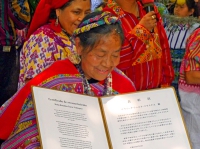By Katherine Marshall, Chair, International Selection Committee for the Niwano Peace Prize
The 29th Niwano Peace Laureate, Rosalina Tuyuc Velasquez, received an extraordinary welcome in Guatemala as she returned home from the Niwano Peace Prize award ceremony on May 10 in Tokyo, and the May 12 symposium in Kyoto. The national celebration that greeted her involved several days of public discussions of peace, of the significance of the Niwano Peace Prize, of Rosalina’s work and contributions, and of the challenges that face Guatemala and the world in the future.
As chair of the International Selection Committee I was privileged to represent the Niwano Peace Foundation there and to witness the excitement sparked by her award. Samuel Lobato, member of the Committee, also participated in the celebrations.
The events put an intense spotlight on the Niwano Peace Prize and the significant challenges that stand in the way of true and lasting peace and justice in Guatemala. In recognizing the work of Rosalina Tuyuc Velasquez, the Niwano award shone a bright light on the continuing violence and injustice in the country, and the special power that indigenous spiritual beliefs bring to the fight for peace. When Rigoberta Menchu received the Nobel Peace Prize in 1992, it shocked the Guatemalan authorities and gave energy and hope to those fighting for peace, in the civil society and community organizations. It still stands today as a major turning point. The Niwano Peace Prize award in 2012 seems likely to have a similar impact, giving a new spirit and determination to those fighting for social justice that includes all citizens of Guatemala and Central America. It highlights the special role of women and the need to heal the painful wounds of history.
Family and many other supporters greeted Rosalina at the airport on May 17, all carrying flags and full of exuberance and joy. They accompanied her to her home and a private family celebration.
But then her spiritual community, her town, and her nation joined in the celebrations.
On May 19, at a sacred ceremonial site, Mayan elders and spiritual guides were part of a day-long event that highlighted Rosalina and the Niwano award. The ceremonies were presided over by Mayan Elders – Rosalina is also a spiritual guide so the Niwano Award was a special honor to her and to her community. Around a fire kept alive all day, surrounded by flowers and offerings of fruit, flowers, rice, and other treasured products of nature, the Elders honored Rosalina with prayers and calls to ancestors and Elders. The Niwano citation was read, and the medal and the certificate were carried around the sacred fire. As representatives of the Foundation, Samuel Lobato and I were honored and danced around the fire also. The day ended with a feast and with many hours of dance.
Then on May 20, there was a remarkable public celebration in San Juan Comalapa, Rosalina’s home town. It began with prayers for the many who disappeared and died in the long years of violence in Guatemala. Then a parade led to her home, where her mother was honored, and plaques unveiled with the street’s new name: Rosalina Tuyuc Velasquez avenue. Then at the central public square there was an ecumenical ceremony, with representative of the Catholic and Protestant churches and of the Mayan spiritual community. It was followed by official speeches and commemorations, including Rosalina’s address and appreciation, and reading of the Niwano award citation. The overall theme was peace and harmony and television, radio, and newspapers covered the events.
A special feature of the parade and celebration was the active engagement of the five remarkable Guatemalan women who have received important international recognition. Rigoberta Menchu received the Nobel Peace Prize in 1992, and she was a leader in the celebrations. The Nobel award in 1992 was a major turning point for Guatemala, serving to give new energy and spirit to those, especially from the indigenous community, working for peace. As the 20th anniversary of the Nobel Prize approaches, this work and energy take on still greater importance, not only as a symbol of the challenge to cease violence but also to work for equality for women and men and for Guatemala’s indigenous population.
Rigoberta Menchu is one of five remarkable women, and all spoke on May 20. Also in 1992, Helen Mack won what is often called “the Alternative Nobel”, the Right Livelihoods Award, honoring her courageous work for human rights. Norma Luz was recognized as a Woman of Courage, recently, by the US State Department, for her work for human rights and against trafficking. And Otilla Luz, has also been recognized for her work for peace, including the Spanish Bartolome de las Casas award. And now Rosalina Tuyuc Velasquez joins this distinguished group of determined women fighting for peace who have pledged to work together with a new spirit and a new energy.
May 21 in the capital city, Guatemala City there was an official celebration. About 250-300 people gathered there, representing a wide spectrum of institutions, including the diplomatic corps and United Nations. Media covered the event and Rosalina’s work for peace was presented as a landmark. In the emotional ceremony, Rosalina received long and warm applause.
The parallels between the landmark award of the Nobel Peace Prize in 1992 and the Niwano Peace Prize in 2012, with its special emphasis on spiritual dimensions of the search for peace, were a common theme in the celebrations.
The Niwano Peace Prize has never had the kind of celebration that Guatemala and Rosalina’s supporters demonstrated. The hope is that its significance will be equally large and lasting. The year 2012 is a critical time for Guatemala, for Mayan spirituality, and for Mayan women, and the Niwano Peace Prize highlights the critical importance of this work for peace.



































